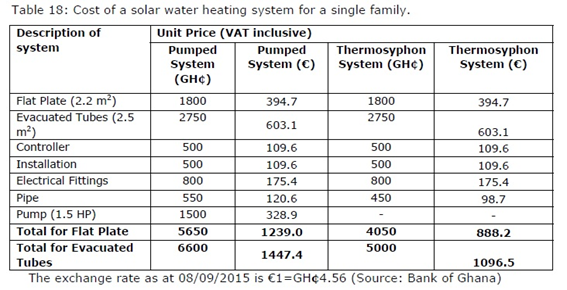The cost of solar water heating systems and components in Ghana varies depending on the country of origin and the company that manufactured it. The price also depends on the type of system that has been installed i.e. direct or indirect and thermo siphon or pumped systems. Some cost information and analysis has been given below.
A Typical Single Family house
Assuming a medium hot water demand of 50l per day, a single-family size of 4 people will demand 200l of hot water daily. The average price for a 200l cost for such system is shown in Table 18.

The cost of a typical large scale commercial installation of a pumped system of a flat plate collector area of 132 m2 and storage tank volume of 9000 litre is estimated at €66,370.00